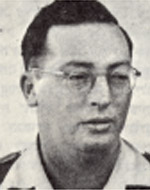Yarchi (Rabnitzky), Yona
Son of Eliyahu and Michal. He was born on the 18th of Shvat 5616 (18.1.1916) in Odessa. In 1921, the Ravinczki family immigrated to Israel in a group of writers from Odessa. Yona studied at the Herzliya Hebrew Gymnasium and completed his studies there. At the age of 16, he joined the HaChugim movement, where he saw a way for himself and accepted the Zionist atmosphere of the house where he grew up, and about the same time he joined the “Mekasher” group that the Haganah organized among the members of the movement. among other works he established the Hagana’s first radio station, He returned to Beit Hashita, where he set up a family and wanted to work in agriculture, but in 1939 he was drafted to the Haganah’s central radio station and taught in various courses. For a short time and once again, he will be immediately selected for the center of the labor arrangement. But in 1941 he was recruited again to work in the Haganah. After a short period of time he was transferred to the “Gideon” battalion. On the day he worked in intelligence and patrols, and at night, with mines and sabotage. At the end of the War of Independence, he returned home and began to work in the garage However, because the security situation worsened, he was again mobilized and became responsible for the security of the kibbutz settlements throughout the north of the country – from Hadera to the Syrian-Lebanese border: He was drafted for eight or nine months, but without a replacement he remained in his position on the kibbutz’s security committee. A month and a half before the Sinai Campaign, he was called upon to be appointed to the flag, and this time as a brigade intelligence officer with the rank of captain. On 27/11/1956 he fell in the battle of Abu-Agila during his assault on his positions. The brigade commander, Lt. Col. Glinka, was buried in the Military Cemetery at Shachal on Friday and on March 31, 1957, he was laid to rest in the cemetery in his kibbutz. He left a wife and four children. On the first anniversary of his death, Kibbutz Beit Hashita published a booklet in his memory. For seven years, the kibbutz, together with the family, used to award a prize for efficiency (financial) in its name to the industry’s best industry during the year; This year’s award was awarded to many participants who attended the ceremony. The farm and family plan to establish a botanical and zoological garden on the grounds of the kibbutz, which will be called “Gan Yona”.
